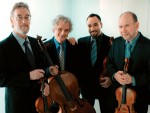Title
Being a part of the Juilliard String Quartet is a life-changing experience. Joining such an iconic quartet is essentially an easy decision but one that carries its share of weight. I had been in a professional quartet before but this is the quartet that introduced the Bartok and Schoenberg string quartets to the United States, and the quartet that introduced me to almost all of the string quartet literature, from Schubert and late Beethoven to Debussy, Janacek, and Carter, to name just a few. Either from dynamic live performances or classic recordings, I can vividly remember hearing all of those pieces for the first time. These experiences left such a strong impression that I am still able to conjure the sounds up as if I listened to them just yesterday.
Body
Teaching at Juilliard, the school I attended, is also a special and unique experience. My colleagues in the quartet have been committed to teaching and mentoring countless private students and virtually all the professional string quartets from the United States performing today. As a student, I was lucky enough to work with numerous legendary musicians, many of whom are no longer with us, and I now look forward to the opportunity of passing on what I have learned at a school that gave me so much, a school that is bursting with talent, energy, and pride.
The actual process of auditioning and joining this incredible quartet was unexpected and extremely enjoyable. I was already quite happy in a completely different world of classical music as concertmaster of the Metropolitan Opera Orchestra, a post I had held for 10 years. I had no expectations after talking with cellist Joel Krosnick—I simply knew that I was going to experience reading some of my favorite quartets with the Juilliard String Quartet, sitting in the chair of Robert Mann, the founder of the J.S.Q. and my mentor back when I was in school. I felt like a kid let loose in a candy store. A few weeks before we played together, I learned that I would be playing with the J.S.Q. not for a few hours, but for two full days! I was surprised, excited, and slightly concerned—I hadn’t played much chamber music in the last decade and felt a bit rusty. Luckily I was more than familiar with much of what we were playing. After just a few bars of Mozart’s K. 489 the first morning, I felt as comfortable and happy as being back on my bicycle from childhood. I knew we would all have a memorable couple of days. After the Mozart we played Schubert’s String Quartet No. 13 in A Minor, a special request of mine as Schubert is the one composer I missed playing most while at the Met. The result was that it was one of the first quartets we decided on when discussing our repertoire for this season. In fact, on our first concert together at Alice Tully Hall next month, we will open the program with the Schubert A Minor.
I am happy to be back to playing in a more nuanced style. Sitting in a great orchestra, especially in the concertmaster chair, is an exhilarating experience, but not one that enables you to completely immerse yourself in the music. You are more of a facilitator, helping the conductor to transmit his ideas to the orchestra, or trying to help the orchestra when there is a less than gifted conductor on the podium. It doesn’t involve nearly as much subtlety as playing in a string quartet and you have to always be focused on the conductor, as well as the entire orchestra. It takes a very different kind of intensity and concentration to play in a string quartet. You can simply focus on the music and less on your surroundings. It is exhilarating in a much more inward way. The personal bonds are also very different. As well as the members of the orchestra at the Met get along with each other, there is always a large disparity in attitude among nearly 100 musicians working together in such close, intense conditions for so many hours at a stretch. In this quartet, to quote violist Sam Rhodes from a recent article, “We have a feeling for each other that is not only profound respect, it is more like we are brothers who will stick up for each other.” Indeed, even in my short time with the quartet, the support and warmth offered to me by my colleagues is well beyond my expectations.
Our two concerts at Alice Tully Hall this season are very significant to me. The first concert, our home opener on December 1, will include the Schubert, Bartok’s String Quartet No. 2, and Beethoven’s Op. 135. The second concert in the spring features an extremely special guest artist joining us in the second half of the program—more details to come. I am proud and excited to be part of the future of the Juilliard String Quartet and The Juilliard School. This new chapter in my life holds much adventure, inner growth, and promises some incredible experiences, both musical and personal.





